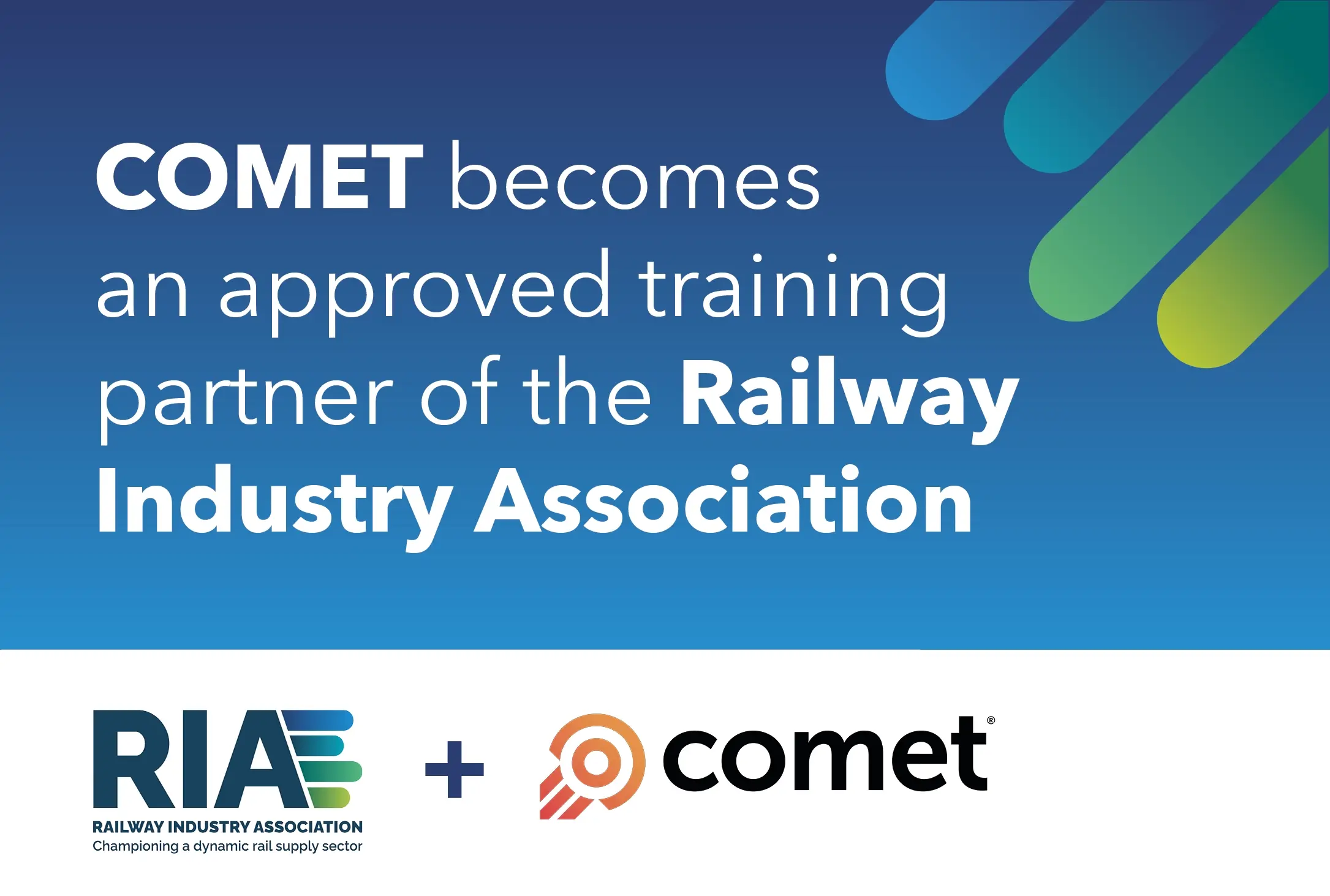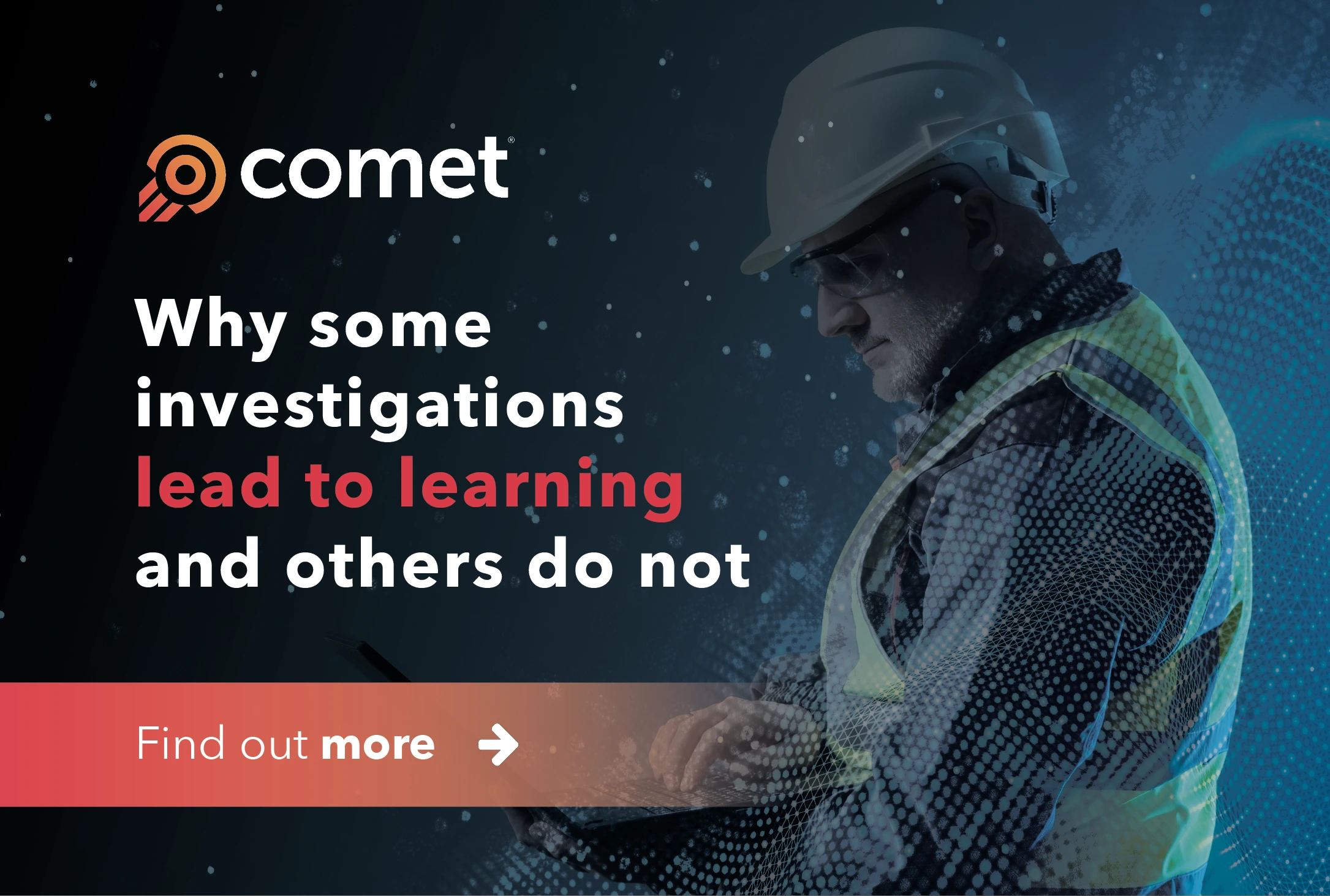What can’t it do? Is it worth the effort to implement?
Can AI really make data management easier? And what are the risks of relying on it too much?
If you work in HSEQ, you’re likely already asking these questions. Most safety teams are managing more data than ever, with growing pressure to reduce incidents, improve performance, stay compliant, and increase productivity, all while facing budget cuts across operations.
Artificial intelligence is often pitched as the next big thing, but many safety professionals are still unsure where the value really lies. At COMET, our focus has been clear for quite sometime. We use AI to make better use of existing data, support smarter decisions, and give clients insights they can act on with confidence.
What problem does COMET solve with AI?
Across global clients, we kept seeing the same issue. Organisations were collecting large volumes of safety and operational data, but had no practical way to analyse it. Valuable insights were buried in narrative reports, spreadsheets, or siloed systems.
The problem wasn’t a lack of data. It was that no one had time to dig through it.
That challenge led to a focused research and development partnership with six global COMET clients and Lloyd’s Register. The result was COMET Signals, an AI-powered analytics platform built specifically for HSE and operational risk teams.
It turns unstructured and structured data into intelligence that supports decision-making, investigations, and long-term performance improvement.
What does COMET Signals do?
COMET Signals uses Natural Language Processing and Machine Learning to read through huge volumes of unstructured data, such as text-based reports, investigation notes, and observation comments.
The platform identifies repeated themes, links them to COMET’s root cause taxonomy, and highlights patterns that may not be obvious through manual review. You can visualise trends, track changes over time, and connect different data types to get a clear picture of where the risks really are.
You can use COMET Signals to spot early warnings, build defensible reports, and support proactive safety management.
Where is AI already being used in health and safety and how does COMET support it?
Here’s a breakdown of key AI usecases in HSE management, and how COMET helps organisations respond effectively.
Data Management
What the industry needs
Organisations want to bring together health, safety, environmental, and operational data from different systems into one view.
Does COMET support data management?
Yes. COMET Signals connects data from across your systems, giving you one place to view, analyse, and understand it. This can include structured data like audit results, as well as unstructured text from reports and investigations.
Through our Power BI integration, COMET offers interactive dashboards that support performance tracking, simplify compliance reporting, and increase operational transparency. This reduces time spent manually collecting data and improves decision-making.
Proactive Risk Management
What the industry needs
Safety teams want to identify patterns before an incident occurs, using past data to predict future risks.
Does COMET support proactive risk management?
Yes. COMET helps organisations identify patterns in historical and current data to anticipate where issues might occur. Through its structured Investigations and RCA module, organisations can categorise incidents consistently, detect systemic issues, and implement targeted corrective actions.
When paired with COMET Signals, users can uncover risk clusters and link them to locations, departments, or specific processes. This visibility supports early intervention, reducing the chance of repeat incidents.
Explore this further here: COMET Investigations and RCA Signals
Streamlining risk management activities
What the industry needs
HSE leaders want to reduce time spent on repetitive admin tasks like data entry, audit scheduling, and supplier follow-ups.
How does COMET help streamline risk management activities?
Yes. COMET can help turn manual, disconnected workflows into structured, integrated processes across the full safety and operational risk managementcy
- COMET Assured simplifies audits and inspections through digital templates, automated scheduling, and real-time scoring. It removes the need for paper-based processes and helps teams track corrective actions through to closure.
Learn more: Assured - COMET Supply Chain automates supplier assurance and risk monitoring. It manages recurring checks, gathers supplier responses, and flags non-conformances or performance issues before they escalate.
Learn more: Supply Chain - COMET Incident Management allows incidents to be logged quickly and consistently from any device. It streamlines how events are captured, investigated, escalated, and followed up. With real-time task assignment, notifications, and integrated tracking, teams can act faster and with more clarity.
Learn more: Incident Management - COMET Investigations and RCA guides users through structured investigations using COMET’s coded taxonomy. This ensures a consistent, repeatable approach to root cause analysis and eliminates the inefficiencies of unstructured reporting or ad hoc investigation models.
Learn more: Investigations and RCA - COMET Signals enhances workflows by automatically highlighting emerging issues and signals in real time. This supports faster prioritisation and smarter resource allocation.
Learn more: AI Data Analytics
Together, these tools reduce the administrative load, improve coordination between teams, and ensure that action is based on consistent, high-quality data across all stages of the safety process.
Regulatory Compliance
What the industry needs
With regulations constantly changing, organisations need to spot compliance gaps early and stay ahead of audits.
Does COMET support regulatory compliance
Yes. The COMET suite was designed to help safety-critical organisations stay ahead of compliance requirements by ensuring operational data is consistent, traceable, and auditable across every part of the process.
- COMET Signals uses machine learning and natural language processing to review large volumes of incident, audit, and inspection reports. It flags signs of non-compliance, identifies procedural drift, and highlights repeat failures that may indicate deeper systemic issues. These insights help teams act earlier and demonstrate continuous improvement.
- COMET Assured ensures that audits and inspections are not only carried out but also documented consistently. It provides a digital audit trail with automated scoring, evidence capture, and action tracking, making it much easier to prove due diligence and accountability to regulators.
- COMET Incident Management standardises how incidents are logged and followed up. It helps ensure that reportable events are captured accurately and that corrective actions are traceable from identification through to closure.
- COMET Investigations and RCA supports defensible investigations by applying a consistent taxonomy and structured workflow. This helps ensure that root causes are identified, not just symptoms, and that any required reporting meets internal and external expectations.
Together, these modules give organisations a reliable, joined-up compliance framework. You can move away from fragmented spreadsheets and manual audit preparation, and instead rely on a live, always-on system that flags issues early, reduces regulatory risk, and provides the evidence to back up your processes.
More here: COMET AI Data Analytics
Does COMET replace human judgement
No. COMET does not replace people. It supports them. Human expertise is still essential in making sense of complex operational decisions. COMET simply improves the signal-to-noise ratio by filtering what matters.
Instead of digging through hundreds of reports, safety leads can access targeted insights. Instead of guessing at priorities, they can see where the risks are rising. With AI-driven support, judgement is enhanced, not removed.
Final thought
The more data you generate, the more important it becomes to understand it. As incident types evolve and expectations rise, safety professionals need better ways to see the risks that are coming, not just respond to the ones that already happened.
AI is not a shortcut. It is a support system. And with the right design, it can help your team go from information overload to clear, confident decision-making.
If your current systems are not helping you get ahead of problems, it may be time to rethink how you are using your data.
Curious how this works in practice?
Download the white paper or get in touch to see how COMET Signals can help turn complex data into clear, preventative action in the waste water industry and how it could do the same for your industry.


.webp)

